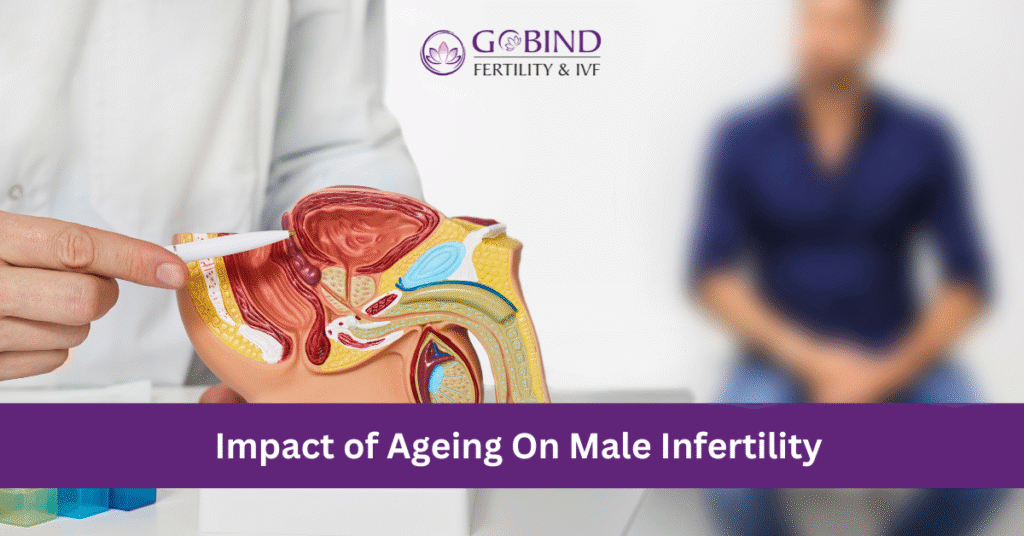The Impact of Ageing on Male Fertility

When discussing fertility, the focus is often on women and the well-known decline in female reproductive potential with age. However, male fertility is not immune to the ticking clock. Although men can biologically father children well into their later years, age does play a significant role in sperm quality, hormonal balance, and overall reproductive outcomes. In recent years, growing research has emphasised that the effects of ageing on male fertility are both real and consequential.
Understanding Male Fertility
Male fertility is primarily determined by the quality and quantity of sperm produced in the testes. A healthy male reproductive system requires the proper functioning of various components, including:
- The production of sufficient quantities of sperm (spermatogenesis)
- Proper motility (the ability of sperm to swim)
- Normal morphology (shape and structure)
- Adequate semen volume
- Balanced levels of reproductive hormones like testosterone, FSH, and LH
These factors contribute to successfully fertilising a female egg and achieving a healthy pregnancy.
Biological Changes with Age
Men produce sperm throughout their lives, unlike women, who are born with a finite number of eggs. However, the process of spermatogenesis is not immune to age-related decline. Studies suggest that male fertility starts to decline around the age of 40, although changes can begin as early as the mid-30s in some men.
Some of the key biological changes include:
- Decreased Testosterone Levels: Testosterone, the primary male sex hormone, declines gradually at a rate of about 1% per year after an age of 30. Lower levels of testosterone can lead to reduced libido, erectile dysfunction, and lower sperm production.
- Sperm Quality Declines: Ageing is associated with a decrease in sperm motility and an increase in sperm DNA fragmentation. This can reduce the chances of fertilisation and may contribute to poor embryonic development.
- Reduced Testicular Volume: The testes may shrink slightly with age, affecting sperm production.
- Increase in Genetic Mutations: Older men have a higher risk of producing sperm with genetic mutations. These mutations can increase the risk of miscarriage or lead to developmental disorders in the offspring.
Age-Related Fertility Risks
As men age, the likelihood of encountering fertility issues increases. Several risks associated with advanced paternal age include:
- Longer Time to Conception: Couples with older male partners may take longer to conceive. Research shows that the probability of conception per cycle decreases with paternal age, especially after age 40.
- Higher Risk of Miscarriage: Studies have found a correlation between paternal age over 40 and increased risk of miscarriage, even when the female partner is younger.
- Birth Defects and Genetic Disorders: Advanced paternal age is linked to a higher risk of certain genetic conditions in children, including:
- Autism Spectrum Disorders
- Schizophrenia
- Achondroplasia
- Bipolar disorder
- Poor Pregnancy Outcomes: Older paternal age may also affect pregnancy outcomes, increasing the likelihood of premature birth and low birth weight.
Impact on Assisted Reproductive Technologies (ART)
With the rise of assisted reproductive technologies such as IVF (in vitro fertilisation) and ICSI (intracytoplasmic sperm injection), many couples turn to medical help for conception. However, the age of the male partner can also influence the success of these treatments.
Studies have shown that:
- Fertilisation and implantation rates decrease with older paternal age.
- Embryos derived from older men are more likely to be of lower quality.
- There’s a higher incidence of chromosomal abnormalities in embryos from older men.
Psychological and Lifestyle Factors
Age not only affects the biological aspects of male fertility but also brings psychological and lifestyle changes that can impact reproductive health. Older men may face increased stress, sedentary lifestyles, and health problems such as diabetes or hypertension, all of which can contribute to decreased fertility.
Additionally, prolonged exposure to environmental toxins, poor diet, smoking, and alcohol use over time can cumulatively impact sperm health.
What Can Older Men Do to Preserve Fertility?
While age-related changes are inevitable, there are several steps older men can take to maintain their fertility and reproductive health:
- Healthy Lifestyle: Regular exercise, a balanced diet, and adequate sleep can help maintain testosterone levels and overall sperm health.
- Avoid Toxins: Limiting exposure to environmental toxins, radiation, heavy metals, and endocrine-disrupting chemicals is crucial.
- No Smoking or Excessive Alcohol: These substances can damage sperm DNA and reduce sperm count and motility.
- Stress Management: Chronic stress can negatively impact hormone levels and libido.
- Regular Medical Check-Ups: Monitoring testosterone levels and managing chronic illnesses can help maintain fertility.
- Consider Sperm Freezing: Men who anticipate a delay in starting a family might consider sperm banking during their younger years, when sperm quality is at its peak.
Debunking Myths
Many believe that male fertility is ageless because there are well-known examples of older men fathering children. While it is biologically possible, these are exceptions rather than the norm. These individual cases don’t represent the overall decline in fertility potential with the age.
It’s also a myth that only a woman’s age matters in fertility planning. Evidence increasingly supports the importance of considering both partners’ ages when assessing reproductive health and planning a family.
Conclusion
The impact of age on male fertility is a topic gaining much-needed attention in the field of reproductive health. While men do not experience a definitive end to their reproductive years like women do with menopause, the decline in fertility and the risks associated with advanced paternal age are real. Men need to be aware of these changes and take proactive steps to preserve their fertility and ensure healthy outcomes for future children.
Fertility is a shared responsibility. As more couples delay parenthood for personal, professional, or financial reasons, understanding the biological realities of ageing—on both sides, is crucial. Awareness, early planning, and healthy living are key to optimising fertility potential, regardless of gender.
